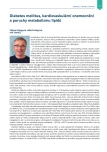-
Medical journals
- Career
Effect of novel anti-diabetic medication on cardiovascular risk
Authors: Katarína Rašlová 1,2
Authors‘ workplace: Metabolické centrum MUDr. Kataríny Rašlovej s. r. o., Bratislava 1; Koordinačné centrum pre familiárne hyperlipoproteinémie, SZU v Bratislave 2
Published in: AtheroRev 2019; 4(2): 91-93
Category: Reviews
Overview
Complex data on very high risk of cardiovascular morbidity and mortality in tape 2 diabetes were the reason why the Food and Drug Administration issued a guidance for industries requiring proof of cardiovascular safety for anti-diabetic medications. Since 2015, comprehensive results from clinical trials of two novel anti-diabetic classes SGLT2 inhibitors and GLP1 receptor agonists were published. The out-come trials showed not only low risk of hypoglycemia, potential to decrease body weight but this treatment was associated with lower risk of major cardiovascular endpoints as well as protection from progression of renal disease. These data had significant affect on decisons of treatment in type 2 diabetes subjects. In 2018, a consensus of ADA/EASD on management of hyperglycaemia was published. The consensus suggests that after metformin as the first line therapy, as the second line treatment should be added SGLT2 inhibitor or GLP1 receptor agonist because of their safety and data on lowering of cardiovascular and renal disease risk. This review article focuses on the two novel classes of anti-diabetic medication.
Keywords:
glucagon-like peptide 1 receptor agonist – type 2 diabetes mellitus
Sources
- Lotufo PA, Gaziano JM, Chae CU et al. Diabetes and all-cause and coronary heart disease mortality among US male physicians. Arch Intern Med 2001; 161(2): 242–247.
- Juutilainen A, Lehto S, Rönnemaa T et al. Type 2 diabetes as a „coronary heart disease equivalent“: an 18-year prospective population-based study in Finnish subjects. Diabetes Care 2005; 28(12): 2901–2907.
- Schramm TK, Gislason GH, Køber L et al. Diabetes patients requiring glucose-lowering therapy and nondiabetics with a prior myocardial infarction carry the same cardiovascular risk: a population study of 3.3 million people. Circulation 2008; 117(15): 1945–1954. Dostupné z DOI: <http://dx.doi.org/10.1161/CIRCULATIONAHA.107.720847>.
- Whiteley L, Padmanabhan S, Hole D et al. Should diabetes be considered a coronary heart disease risk equivalent?: results from 25 years of follow-up in the Renfrew and Paisley survey. Diabetes Care 2005; 28(7): 1588–1593.
- Sandoval D, Sisley SR. Brain GLP-1 and Insulin Sensitivity. Mol Cell Endocrinol 2015; 418(Pt 1) : 27–32. Dostupné z DOI: <http://dx.doi.org/10.1016/j.mce.2015.02.017>.
- Smith EP, An Z, D’Alessio DA et al. The role of β cell glucagon-like peptide-1 signaling in glucose regulation and response to diabetes drugs. Cell Metab 2014; 19(6): 1050–1057. Dostupné z DOI: <http://dx.doi.org/10.1016/j.cmet.2014.04.005>.
- Norton I, Shannon CE, Fourcaudot M et al. sodium glucose transporter an d glucose transporter expression in the kidney. of type 2 diabetic subjects. Diabetes Obes Metab 2017; 19(9): 1322–1326. Dostupné z DOI: <http://dx.doi.org/10.1111/dom.13003>.
- Zinman B, Wanner C, Lachin JM et al. Empagliflozin, cardiovascular outcomes, and mortality in type 2 diabetes. N Engl J Med 2015; 373(22): 2117–2128. Dostupné z DOI: <http://dx.doi.org/10.1056/NEJMoa1504720>.
- Neal B, Perkovic V, Mahaffey KW et al. Canagliflozin and cardiovascular and renal events in type 2 diabetes. N Engl J Med 2017; 377(7): 644–657. Dostupné z DOI: <http://dx.doi.org/10.1056/NEJMoa1611925>.
- Zelniker TA, Wiviott SD, Raz I et al. SGLT2 inhibitors for primary and secondary prevention of cardiovascular and renal outcomes in type 2 diabetes: a systematic review and meta-analysis of cardiovascular outcome trials. Lancet 2019; 393 (10166): 31–39. Dostupné z DOI: <http://dx.doi.org/10.1016/S0140–6736(18)32590-X>.
- Marso SP, Daniels GH, Brown-Frandsen K et al. Liraglutide and cardio-vascular outcomes in type 2 diabetes. N Engl J Med 2016; 375(4): 311–322. Dostupné z DOI: <http://dx.doi.org/10.1056/NEJMoa1603827>.
- Marso SP, Bain SC, Consoli A et al. Semaglutide and cardiovascular outcomes in patients with type 2 diabetes. N Engl J Med 2016; 375(19): 1834–1844. Dostupné z DOI: <http://dx.doi.org/10.1056/NEJMoa1607141>.
- Zhuang XD, Xin H, Yang D et al. Comparative cardiovascular outcomes in the era of novel anti-diabetic agents: a comprehensive network meta-analysis of 166,371 participants from 170 randomized controlled trials. Cardiovasc Diabetol 2018; 17(1): 79. Dostupné z DOI: <http://dx.doi.org/10.1186/s12933–018–0722-z>.
- Davies MJ, D’Alessio DA, Fradkin J et al. Management of Hyperglycaemia in Type 2 Diabetes, 2018. A Consensus Report by the American Diabetes Association (ADA) and the European Association for the Study of Diabetes (EASD). Diabetes Care 2018; 41(12): 2669–2701. Dostupné z DOI: <http://dx.doi.org/10.2337/dci18–0033>.
Labels
Angiology Diabetology Internal medicine Cardiology General practitioner for adults
Article was published inAthero Review

2019 Issue 2-
All articles in this issue
- Diabetes mellitus, kardiovaskulární onemocnění a poruchy metabolizmu lipidů
- New hypolipidemic agents in the treatment of diabetic dyslipidemia
- The role of bilirubin in diabetes, metabolic syndrome and cardiovascular diseases
- Hypertension and diabetes – malignant cardiometabolic combination
- Effect of novel anti-diabetic medication on cardiovascular risk
- Hypolipidemic treatment and microvascular complications of diabetes
- ODYSSEY OUTCOMES Study: other clinical relevant analyses
- HDL-C and stratification of individual risk
- Current medical literature: exploration of facts
- 22. kongres o ateroskleróze
- Athero Review
- Journal archive
- Current issue
- Online only
- About the journal
Most read in this issue- The role of bilirubin in diabetes, metabolic syndrome and cardiovascular diseases
- New hypolipidemic agents in the treatment of diabetic dyslipidemia
- Effect of novel anti-diabetic medication on cardiovascular risk
- Hypolipidemic treatment and microvascular complications of diabetes
Login#ADS_BOTTOM_SCRIPTS#Forgotten passwordEnter the email address that you registered with. We will send you instructions on how to set a new password.
- Career

